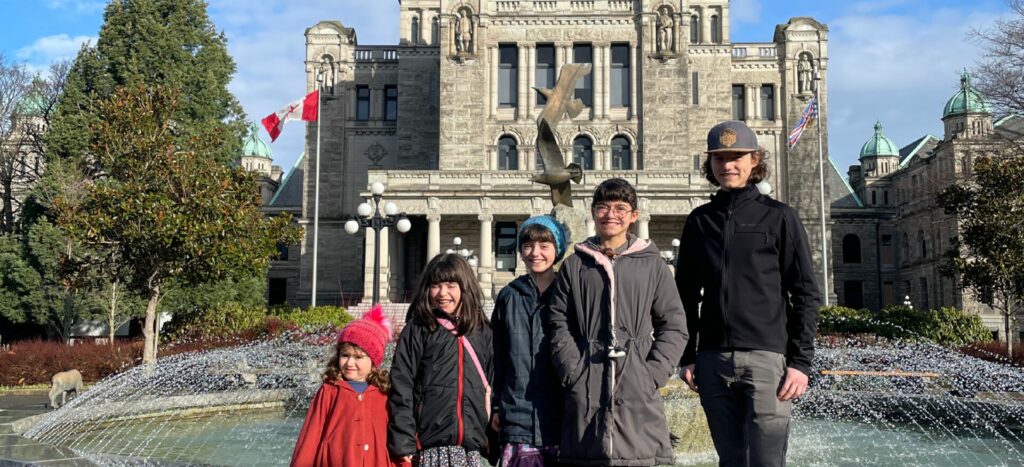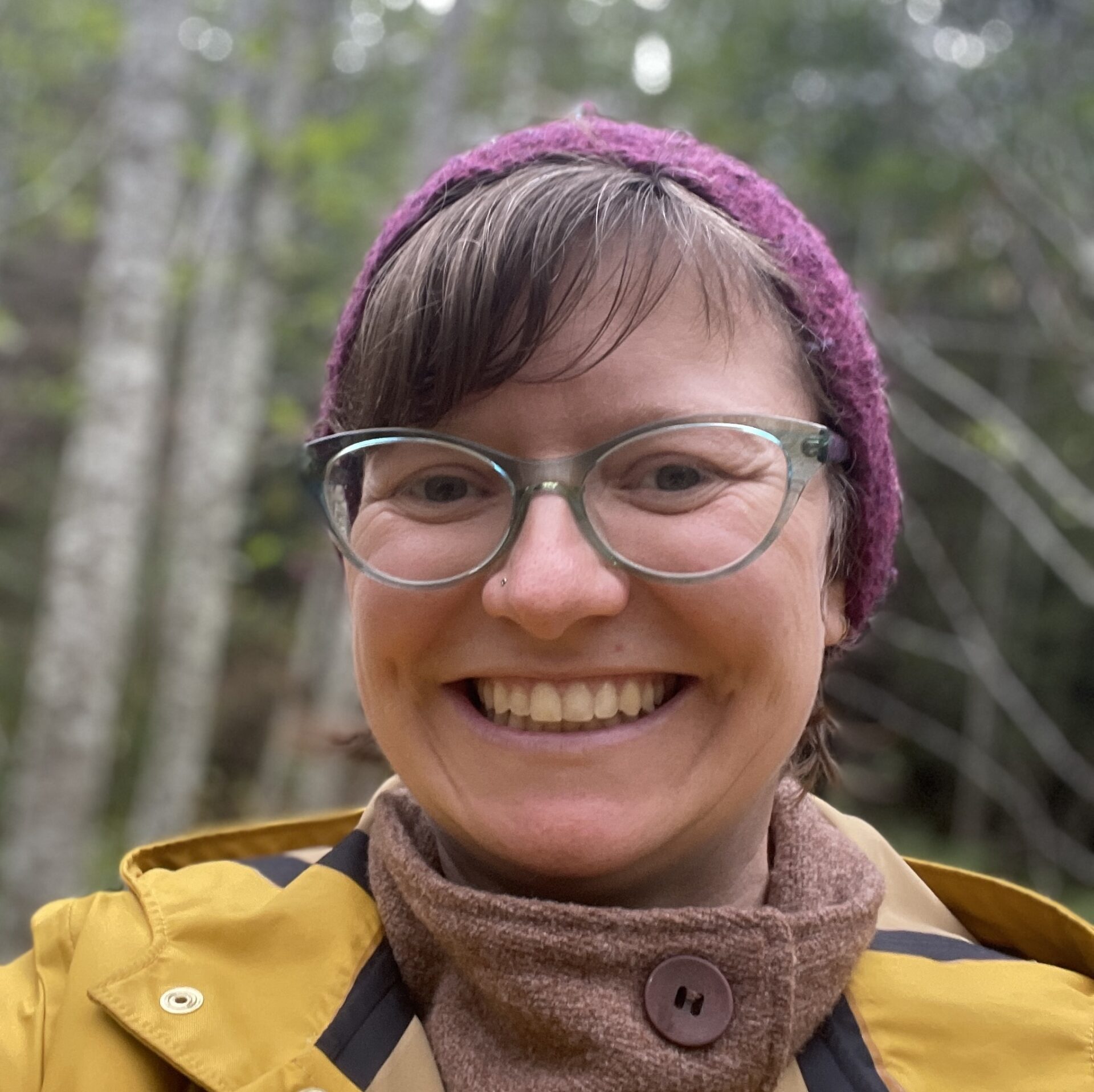For us, the idea isn’t to have school at home, but to learn in and with our community—being out there making connections and building relationships that lead to a greater desire or drive for the learners to discover their interests.
Olena Starchuk
Olena Starchuk and Mike Russell are the co-parents of five children, ages four to sixteen, living on Denman Island, an island community of about 1,200 in British Columbia, Canada. Olena is a former public school teacher, school counselor, and curriculum writer. Mike serves as the director of communications for the Cowichan Valley School District. During this conversation, Olena and Mike share how home learning has worked for their family and community.
Q: Can you share a bit about your current work in education?
Olena: I’ve been facilitating education with parents and home learners for about 15 years. I started off doing parenting workshops—parenting support, breastfeeding support, that sort of thing—and then started delving more into the homeschooling end of things. I spend most of my time learning with my kids as well as volunteering at various places across the island, including the Nature Conservancy and the Marine Stewards.
Mike: I am the director of communications for the Cowichan Valley School District. I’ve been here for about five years. I run all the communications for the school district plus all of the crisis response initiatives. In terms of my communication role, I work a lot with narrative change and helping our school district and public education in general to be seen as a public good across British Columbia. All of the work I do is multifaceted.
Q: Can you tell us more about Cowichan Valley School District’s campaign to help engage people in seeing education as a public good?
Mike: It started with our last strategic plan and a call to action named Beyond Education. It was about engaging with the community and finding out what the community needed from their public education.
We know that in our modern society, we have housing insecurity, food insecurity, mental health concerns, and different family structures that impact our needs as a district. Our strategic plan really set us on a path to be seen as a valued community partner that can offer so much more than just an education.
We have a vibrant Indigenous population as well who make up about 23% of the Cowichan Valley School District. We service nine different First Nations communities. There are many stakeholders who we serve so the work always has many aspects to it and is extremely rewarding.
Q: Having currently and previously worked in public education, what went into the decision to offer an alternative to school to your children? And what does that look like for your family?
Olena: When I first started working outside of a school, I was working in parent education, specifically around attachment parenting. A lot of that explores relationships and connection with community. That very quickly led into an exploration of what the public schools look like around here and how that works for us as a family. We looked at the kinds of relationships and lifestyles we want to have with our kids and within the community. From there, after exploring a bunch of different options, we landed on the idea of learning outside of a school.
We’ve been learning in community ever since. That’s currently what I help other people figure out how to do. For us, the idea isn’t to have school at home, but to learn in and with our community—being out there making connections and building relationships that lead to a greater desire or drive for the learners to discover their interests.
Activities don’t always need to be child oriented for kids to learn—it’s anything they want to be involved in as a community.
Olena Starchuk
Q: Have you found a lot of support from the community around it? Or are you the primary person leading and planning all the learning experiences?
Olena: That depends. Support from community, yes. I make a very big point of going out in the community and looking for things for us to get involved in. I don’t particularly look for things that are aimed towards children because those usually don’t connect deeply to other aspects of the community. For example, I will search out the person on the island who’s the expert birder and we will go out with him. He loves my kids and takes them out all the time. Our eldest daughter is actually the featured birder for the Birdathon this year.
There’s a huge amount of support from community members in that sense. In terms of the remainder of the home learning community, I do tend to take the lead. I have had situations in certain communities where there have been more experienced home learners that will help me out and that’s really lovely to have too. Although that has started to shift in the last few years as my mentors’ children have grown up. They’re in their twenties and in university. Now, I’m helping to organize things for other families.
Mike: We have always been very intentional about learning—from every toy that has been brought into the household, to every book we suggest to our kids, to every person we bring into our lives. It’s all based on how we can help our children become better members of our community and enhance their knowledge of all sorts.
Olena does a lot of networking and outreach, but sometimes community members reach out to us. We recently had a fellow who is a retired doctor that does woodworking, literally knocked on the door and asked if our son would be interested in learning woodworking. And now that’s a hobby my son has picked up!
Q: What types of resources do you think could make home learning more accessible to people in your community?
Olena: I think one of the first things that people need when home learning is to find a supportive community. Right now, there aren’t a lot of opportunities for parents to get together and offer each other peer support. When parents can get together and share what is happening at home and hear another parent say, “Oh yeah, my kids do that too,” you feel validated. You’re not feeling like you’re doing something wrong. That support is huge.
Other resources that are helpful for people are networks that show people where they can go to find community connections. So for example, a resource list of the nearby museums and places that run field trips, or a list of community mentors that like working with kids.
Mike: I think we could also use a physical location for families to come together to do this. We have some spaces in the community that hold teen nights and things like that, but I think a consistent physical location would be really beneficial. Not only as a safe space to meet, but also somewhere to build community around.
Q: What’s something you wish more people knew about learning in community?
Olena: I think one of the most important things to remember when you’re talking about learning through life and learning in community is that your goal is to build relationships, create wonder and curiosity, and encourage young people to pursue their own interests. You’re not doing the same sorts of things that somebody would imagine as schooling. You’re typically not sitting down and teaching them things unless they want you to sit down and teach them things. You’re out there counting shells on the beach or growing plants out in the garden or going for a bird walk with a bunch of seniors with decades of experience.
It took me about a year to figure out how to do things differently because we’re not doing school at home—we’re learning in life, which is entirely different. Learning doesn’t have to look a certain way.
Mike: It’s so relational, too. Whenever we go somewhere, people are typically thrilled that our kids are there as well. We started going to community ping pong on Sunday mornings. The guy that runs it loves that we go because most of the people are 75 years old and then seven of us roll in—all in their 40s or under. This past time, we brought five additional kids, too.
Olena: I also hope people can see how much children can learn from their community and outside of a classroom. When we were living in Victoria, we were hugely involved in cycling and pedestrian infrastructure, making sure that the places in the city were friendly and safe for all ages and all abilities. We got involved with the cycling coalition and ended up doing a lot of consulting with the city on the infrastructure that now exists in Victoria. And our kids were involved in that all along the way.
One night, we were at a meeting and the kids decided to go into another room because they wanted to talk about a different topic. They ended up talking to the mayor and a bunch of other people while we’re elsewhere consulting on infrastructure. I think they were seven or eight at the time. I was so proud and inspired. Activities don’t always need to be child oriented for kids to learn—it’s anything they want to be involved in as a community. Young people can be involved in many aspects of our world, even if it is not specifically designed for them. And most times, they’re more than welcome!


